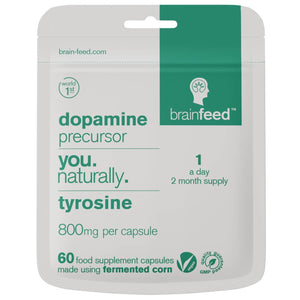Do dopamine detoxes work? Dopamine fasting the right way.
filter
Dopamine detox and dopamine fasting are trends that come up connecting dopamine and social media. What is a dopamine detox? Mainstream media depicts a dopamine detox as a monk lifestyle free of connections with the outside world and its distractions, even the Kardashians swear by dopamine fasting to detox. Though this may look ideal, there are many misconceptions. Dopamine fasting reddit trends may suggest restricting phone use and screen time and even incorporating dietary restrictions in hopes of limiting dopamine “overload”. Does a dopamine detox work? Or is it a media fad?
What is dopamine?
The brain chemical centrally involved in reward and pleasure is dopamine. It is released when the brain is expecting or anticipating a reward [1 Trusted Source 2012 - The Journal of Neuroscience Human study Dopaminergic Mechanisms of Individual Differences in Human Effort-Based Decision-Making ] . It is also involved in motivation to seek those rewards. Good food, sex, exercise, music, socialising, thrill-seeking and other feel-good activities give you a dopamine surge. Under normal, healthy conditions, this is an essential part of enjoying life’s experience. Boost your dopamine levels with brain feed's building block to dopamine.
Dopamine’s role is well studied in habit formation due to its involvement in building behaviour. Habits and behaviours can be good or bad, and both are driven by dopamine. This opens the door to impulsive behaviour, which drives the media and celeb culture towards dopamine detox.
Can you give your brain a dopamine detox?
Dopamine is an excitatory brain chemical that is normally and naturally produced in your brain every day. Detoxing your brain completely of dopamine is impossible. That would also involve trying to detox your brain off the will to work on your passionate project or pursue career progression. Healthy levels of dopamine help you garner new experiences, take risks, and harbour community spirit. Read more about dopamine’s role here. Dopamine is the good guy. The focus is to channel dopamine towards healthy and productive habits, as opposed to detoxing your brain of dopamine.
Dopamine detox: The original story
Dr Cameron Sepah, an American psychiatrist developed dopamine fasting (dopamine detox) in 2019, as a form of therapy to manage impulsive and addictive behaviours [2 Trusted Source 2021 - Lifestyle Medicine Research evaluation Maladaptive or misunderstood? Dopamine fasting as a potential intervention for behavioral addiction ] . A journalist put her spin to the story, propelling this into the trend where CEOs and tech entrepreneurs were cutting off stimulation like food and gadgets for 24 hrs to “reset” dopamine levels. Practices proposed were meditating, drinking water and walking. The media frenzy over this promoted extreme habits despite it being impossible to eliminate brain dopamine completely. The brain is well designed to balance its levels on its own when you practise a healthy lifestyle.
How to dopamine detox the right way?
Dopamine fasting was designed for controlling impulsive behaviours, which include using food as an emotional outlet, prolonged internet/gaming use, and gambling/shopping addictions etc. The aim is to resolve regular activities that have become harmful behaviours. These habits impact living a healthy balanced life. Dopamine detox benefits those who do it the right way. The right way to practise dopamine fasting/detox is to restrict these addictive habits to a specific time slot, which will eventually help to resolve the addiction. While restricting these habits, it is encouraged to replace them with healthier alternatives [2]. For example, someone who goes on an online shopping spree after work hours can refrain from it by joining a health or hobby club. Dopamine fasting rejects ideas that you need to exclude pleasures of life or resort to extreme measures.. Simple ways to regulate your habits include [3 Trusted Source 2023 - Psych Central 3rd-party source Dopamine Detox: Does it Work? ] :
-
Understand the root cause
The first step is to understand why you engage in behaviours detrimental to your lifestyle. If you find yourself compulsively shopping, delve deeper to understand where this comes from. Is it boredom? Is it a lack of insight on what you already own? It is a good idea to seek professional help if you struggle with this. -
Develop healthy barriers
The second step to control an unhealthy habit is to restrict access to it. Taking small steps can make a big difference. Avoid stocking up on unhealthy snacks at home to limit late night snacking habits. Keep your phone away from your bed to prevent the endless social media scroll each morning. -
Replace the bad with the good
The next step is to fill up the time that the unhealthy habit occupies. Swap the bad habit with a good one to limit the craving for the impulsive actions. Sign up to volunteer every Sunday if that is when you indulge in unhealthy behaviours.
You can still enjoy the things you love without being overwhelmed. Dopamine fasting, the right way, can definitely help regulate unhealthy behaviour and replace them with healthy, productive habits. That sounds like a good detox.
References
-
Treadway, M.T. et al. (2012). Dopaminergic Mechanisms of Individual Differences in Human Effort-Based Decision-Making. The Journal of Neuroscience, [online] 32(18), pp.6170–6176. https://www.jneurosci.org/content/32/18/6170
-
Fei, Y.Y., Johnson, P.A., Omran, N.A.L., Mardon, A. and Johnson, J.C. (2021). Maladaptive or misunderstood? Dopamine fasting as a potential intervention for behavioral addiction. Lifestyle Medicine. https://onlinelibrary.wiley.com/doi/10.1002/lim2.54
- Psych Central. (2023). Dopamine Detox: Does it Work? [online] https://psychcentral.com/blog/dopamine-fasting-probably-doesnt-work-try-this-instead


 alertness
alertness
 cognition
cognition
 sleep
sleep
 wellbeing
wellbeing







Leave a comment
Open tab